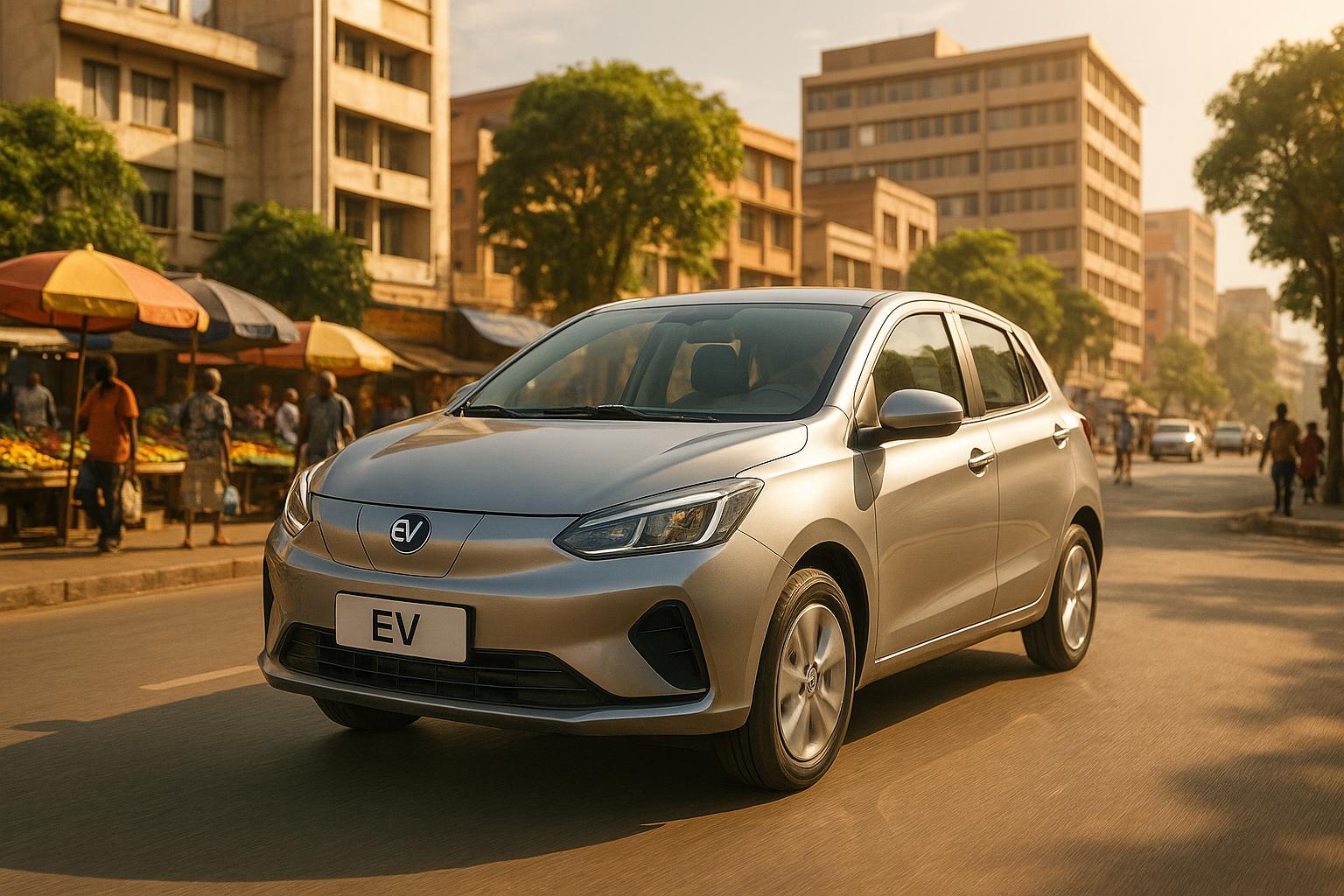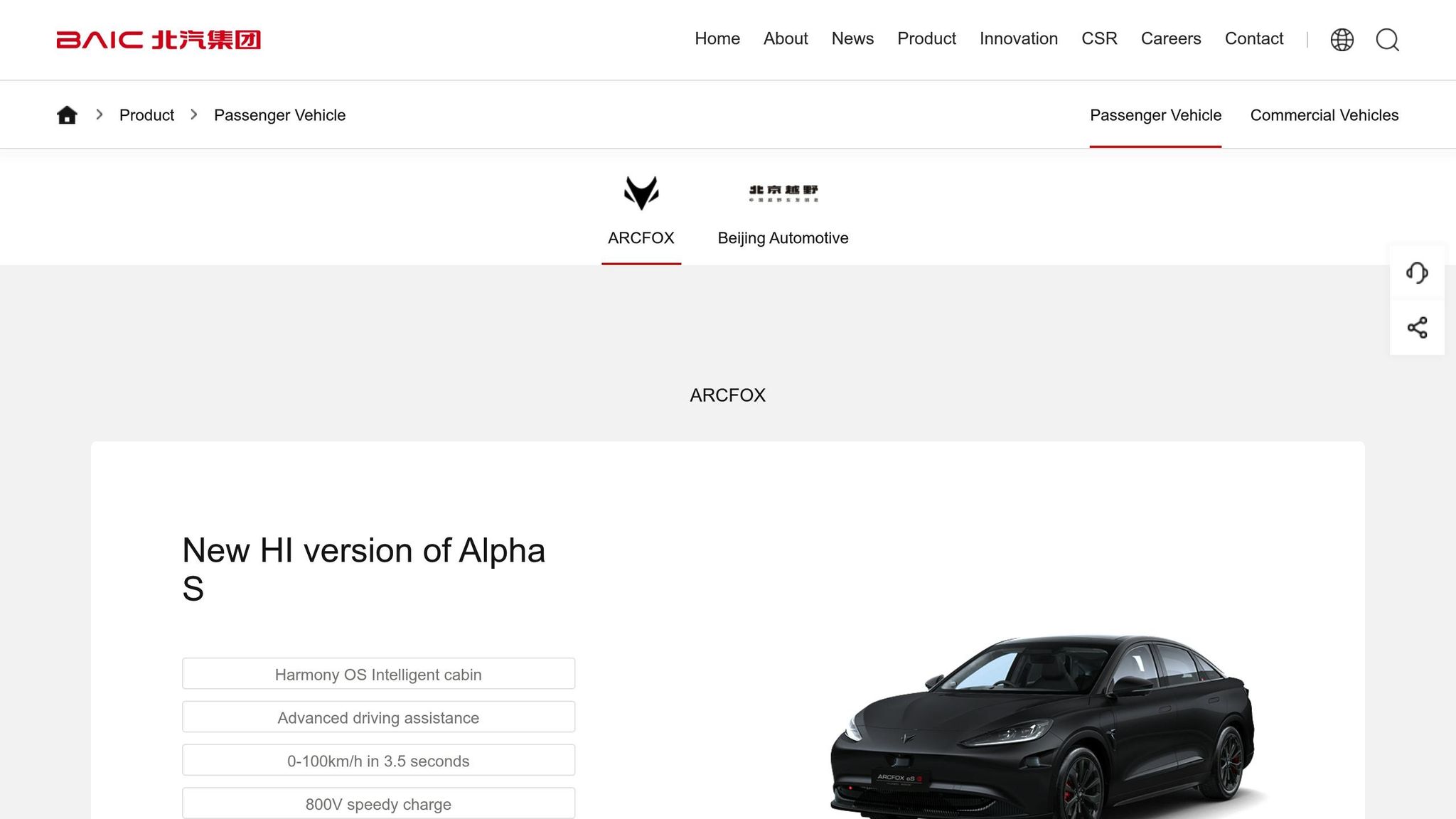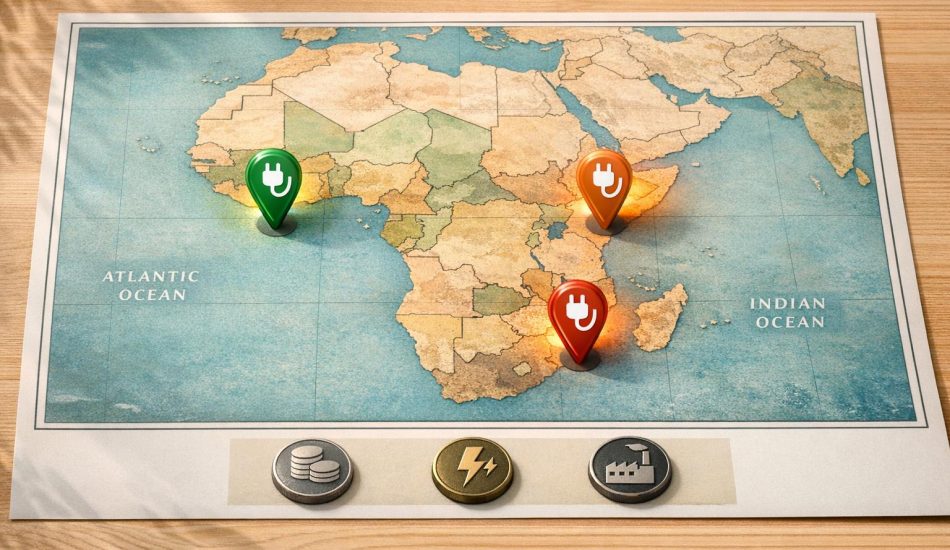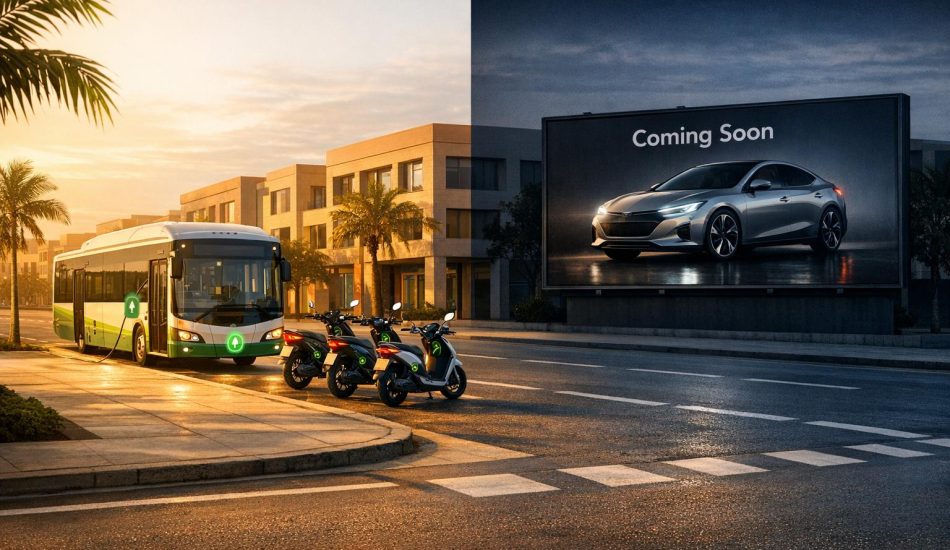
BAIC, a leading Chinese automaker, is expanding its electric vehicle (EV) offerings in Africa through EV24.africa, a platform serving all 54 countries on the continent. The lineup includes the EC Series, designed for urban commuting, and BJEV models, which cater to long-distance and commercial use. Both prioritize affordability, reliability, and features tailored for African conditions. Here’s what you need to know:
- EC Series: Compact, efficient, and ideal for city driving. Offers a range of 93–186 miles per charge, with AC and DC charging options.
- BJEV Models: Built for diverse terrains and longer trips, featuring swappable batteries for reduced downtime. Production in Egypt starts in late 2025, aiming to lower costs.
EV24.africa supports buyers with transparent pricing, financing, shipping, and maintenance services, making EVs accessible even in remote areas. Whether you’re a city commuter or a business owner, BAIC’s EVs provide practical options for Africa’s growing shift to electric mobility.
Stymied in the West, Chinese EV Brands Look to Expand in Africa
BAIC EC Series and BJEV Models: Features and Availability

BAIC brings its electric vehicle lineup to Africa through two key offerings: the EC Series and the BJEV models. These vehicles are designed to meet a variety of needs, blending affordability with reliability.
The EC Series is BAIC’s compact option, tailored for city life. It features a lightweight build, efficient batteries, and convenient charging, making it ideal for daily urban commutes.
On the other hand, the BJEV models cater to both passenger and commercial use. This range includes sedans and small SUVs capable of handling longer trips, offering a more versatile solution for diverse travel requirements.
Both lines incorporate regenerative braking to improve energy efficiency and advanced safety features to ensure passenger protection.
To enhance the customer experience, BAIC has introduced EV24.africa, a dedicated platform that serves all 54 African countries. The website provides everything buyers need, including detailed vehicle specs, transparent local pricing, and financing options tailored to different markets. Shoppers can explore listings with high-quality photos, technical details, and performance data, empowering them to make well-informed decisions.
The platform doesn’t stop at vehicle sales. It also simplifies the purchasing process with shipping and logistics services, ensuring BAIC electric vehicles are accessible even in remote areas. For ongoing support, EV24.africa offers expert maintenance services and technical assistance. Flexible financing plans are available to accommodate the economic diversity across African markets.
To further build trust and foster a sense of community, the platform includes a customer review system, allowing users to share their experiences and insights. This feature not only helps prospective buyers but also encourages confidence in the shift to electric mobility.
1. BAIC EC Series
Performance
The BAIC EC Series is designed to tackle the challenges of urban life in Africa with its electric drivetrain, making it a practical choice for city driving. Its compact electric motor provides smooth acceleration, ideal for stop-and-go traffic. Thanks to its lightweight construction, the vehicle is energy-efficient, allowing drivers to get more miles out of each charge.
With a driving range of 93–186 miles on a single charge, this EV is well-suited for daily commutes within city limits. Longer trips between cities may require planned charging stops. The regenerative braking system adds another layer of efficiency, extending the range by about 10–15% compared to traditional braking systems.
This solid performance is further enhanced by the EC Series’s integrated technology.
Technology
The EC Series comes equipped with modern connectivity features to meet the needs of today’s drivers. Its infotainment system supports smartphone integration, making it easy to access navigation, music, and communication apps directly through the vehicle’s display. USB charging ports are included to keep devices powered during journeys.
When it comes to charging, the EC Series offers both AC and DC options. Using a standard household outlet for AC charging requires about 8–10 hours for a full charge. On the other hand, DC fast charging can bring the battery up to 80% in just 30–40 minutes. This flexibility is especially useful in Africa, where charging infrastructure can vary greatly between urban and rural areas.
Design
The EC Series combines performance and technology with a design focused on urban practicality. Its compact, aerodynamic styling makes it ideal for navigating narrow streets and crowded city centers.
Inside, the cabin is thoughtfully designed to maximize passenger comfort despite the vehicle’s small size. The interior prioritizes simplicity and durability, with materials chosen to withstand Africa’s diverse climate conditions. Storage compartments are strategically placed for everyday convenience, and the rear seats can fold down to create extra cargo space when needed.
Pricing and Affordability
As an entry-level EV in Africa, the EC Series offers an affordable option for those looking to switch to electric mobility. Pricing, available through EV24.africa, varies by country and local market conditions, but it is generally much lower than premium EV brands. This makes the EC Series accessible to middle-class buyers who might have previously considered EVs out of reach.
Flexible financing options allow buyers to spread the cost into manageable monthly payments. On top of that, the lower operating costs of an electric vehicle provide significant savings over time, making it a cost-effective choice for African drivers.
Suitability for African Conditions
The EC Series is tailored to meet the unique driving conditions found across Africa. Its air conditioning system is efficient at managing interior temperatures in hot climates, though it does slightly reduce the driving range. The vehicle’s battery management system is equipped with thermal controls to prevent overheating, ensuring reliable performance in extreme heat.
While its ground clearance is modest due to the compact design, it is sufficient for paved urban roads. However, the EC Series is better suited for city driving and may struggle on unpaved rural roads. The simplified mechanical design makes maintenance easier, a significant advantage in areas where electric vehicle service centers are still developing.
Additional features like dust protection help shield electrical components from Africa’s often dusty environments. The charging port is weatherproofed to keep moisture and debris out, ensuring reliable operation across a variety of climates.
sbb-itb-99e19e3
2. BAIC BJEV Models
The EC Series may be ideal for city commutes, but BAIC’s BJEV models expand the lineup to cater to the diverse driving demands found across Africa.
Performance and Technology
BJEV models are designed with Africa’s developing charging infrastructure in mind. By incorporating swappable battery technology, they aim to reduce downtime during longer trips, offering a practical solution for extended journeys.
Design and Suitability for African Conditions
Built to handle Africa’s unique challenges, BJEV models come with features tailored to the region’s diverse conditions. Their robust design ensures dependable performance, addressing both environmental factors and infrastructural limitations. From varied climates to rugged terrains, these vehicles are engineered to deliver reliability across the board.
Pricing and Affordability
Affordability is a key focus for BAIC, supported by their local manufacturing efforts in Egypt. With production expected to begin by the end of 2025, the initiative currently sources 48% of components locally, with plans to increase this to 58%. This approach not only reduces production costs but also allows BAIC to offer competitive pricing to African consumers.
Pros and Cons
When considering BAIC’s electric vehicles for the African market, the EC Series and BJEV models each bring their own strengths and challenges. Understanding these can help buyers decide which option aligns best with Africa’s evolving transportation needs.
The EC Series shines in urban settings with its compact design, making it ideal for city commutes. However, its limited range means it may not be the best choice for longer journeys unless carefully planned. This makes it a strong contender for daily urban use but less practical for extended trips.
On the other hand, the BJEV models offer a swappable battery system, significantly reducing downtime for recharging. Built with durability in mind, these vehicles are designed to handle Africa’s diverse road conditions, making them a better fit for long-distance travel and commercial use. However, they come with higher upfront costs and a more complex maintenance process.
Here’s a side-by-side comparison of the two:
| Aspect | EC Series | BJEV Models |
|---|---|---|
| Strengths | Compact design, efficient for city driving, easy maintenance | Swappable battery system, durable for rough terrains, suited for longer trips |
| Challenges | Limited range for extended travel | Higher initial cost and more complex upkeep |
| Best For | Daily city commutes, first-time EV buyers, budget-conscious users | Long-distance travel, commercial purposes, varied terrains |
| Charging Infrastructure | Standard urban charging setups | Requires dedicated battery swap stations |
Charging infrastructure is another key difference. The EC Series is compatible with standard urban charging networks, making it convenient for city dwellers. Meanwhile, BJEV models rely on battery swap stations, which, while efficient, may limit flexibility in areas where these facilities are not yet widely available.
These distinctions highlight how each model caters to specific needs, laying the groundwork for a broader evaluation of BAIC’s electric vehicle lineup in Africa.
Conclusion
BAIC is carving out a space in Africa’s electric vehicle market with two distinct offerings: the EC Series for affordable urban commuting and the BJEV models designed for businesses and long-distance travel.
The EC Series is a great option for city dwellers and first-time EV buyers, while the BJEV lineup caters to companies with more demanding operational needs. For businesses, the BJEV models provide a practical solution that aligns with their commercial requirements.
BAIC’s commitment to Africa goes beyond just selling EVs. The company has ambitious plans to produce 50,000 units annually in Egypt within the next five years. This move is set to make electric vehicles more affordable and accessible across the region.
With these tailored options, BAIC is playing an active role in driving the adoption of electric mobility across the continent. Whether it’s the EC Series for everyday urban use or the BJEV models for business, both contribute to Africa’s growing shift toward sustainable transportation.
FAQs
What are the benefits of swappable battery technology in BJEV models for long-distance travel in Africa?
Swappable battery technology in BJEV models is transforming long-distance travel across Africa by significantly reducing the time spent on recharging. Rather than waiting for a battery to charge, drivers can swap out a drained battery for a fully charged one in just minutes. This approach ensures quicker, more seamless journeys.
This solution proves particularly practical in regions where charging infrastructure is scarce, minimizing delays and adding a layer of convenience. Plus, these batteries can be recharged using renewable energy sources, aligning with eco-friendly goals while catering to the specific transportation challenges of the African market.
Why is the BAIC EC Series a great choice for urban commuting in African cities?
The BAIC EC Series stands out as a smart option for urban commuting in African cities. Its compact design makes it a breeze to navigate through congested streets and squeeze into tight parking spots. Plus, with an electric range of up to 128 miles, it easily meets the daily travel demands of city drivers – all while being kind to the environment.
Packed with practical features like adjustable headlights, advanced safety systems, and a thoughtfully designed interior, the EC Series ensures a comfortable and secure driving experience. Designed specifically for city life, it delivers a dependable and efficient way to tackle the challenges of urban mobility.
How does EV24.africa make BAIC electric vehicles more accessible and affordable across Africa?
EV24.africa is making BAIC electric vehicles easier to own by offering models that fit a wide range of budgets, with prices starting at just $9,500. To make the transition to electric vehicles even smoother, they provide flexible financing plans, allowing customers to manage payments more comfortably.
The platform also simplifies the import process and takes advantage of duty exemptions in specific countries. For example, in Nigeria, certain models are available for approximately $8,000. By addressing these challenges, EV24.africa is helping to lower costs and bring electric mobility within reach for more people across the continent.




